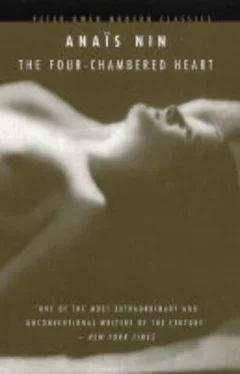Anaïs Nin - The Four-Chambered Heart
Здесь есть возможность читать онлайн «Anaïs Nin - The Four-Chambered Heart» весь текст электронной книги совершенно бесплатно (целиком полную версию без сокращений). В некоторых случаях можно слушать аудио, скачать через торрент в формате fb2 и присутствует краткое содержание. Год выпуска: 2004, ISBN: 2004, Издательство: Peter Owen Limited, Жанр: Классическая проза, Эротические любовные романы, на английском языке. Описание произведения, (предисловие) а так же отзывы посетителей доступны на портале библиотеки ЛибКат.
- Название:The Four-Chambered Heart
- Автор:
- Издательство:Peter Owen Limited
- Жанр:
- Год:2004
- ISBN:9780720611557
- Рейтинг книги:3 / 5. Голосов: 1
-
Избранное:Добавить в избранное
- Отзывы:
-
Ваша оценка:
- 60
- 1
- 2
- 3
- 4
- 5
The Four-Chambered Heart: краткое содержание, описание и аннотация
Предлагаем к чтению аннотацию, описание, краткое содержание или предисловие (зависит от того, что написал сам автор книги «The Four-Chambered Heart»). Если вы не нашли необходимую информацию о книге — напишите в комментариях, мы постараемся отыскать её.
The Four-Chambered Heart — читать онлайн бесплатно полную книгу (весь текст) целиком
Ниже представлен текст книги, разбитый по страницам. Система сохранения места последней прочитанной страницы, позволяет с удобством читать онлайн бесплатно книгу «The Four-Chambered Heart», без необходимости каждый раз заново искать на чём Вы остановились. Поставьте закладку, и сможете в любой момент перейти на страницу, на которой закончили чтение.
Интервал:
Закладка:
…she was making a selfish journey…
…she had intended the barge for other purposes than for a mortuary…
…war was coming…
…the greater the turmoil, the confusion, the greater had been her effort to maintain an individually perfect world, a cocoon of faith, which would be a symbol and a refont>
…the curtain of dawn would rise on a deserted river…
…on two deserters…
…in the imminence of death she seized this intermediary region of our being in which we rehearse our future sorrows and relive the past ones…
…in this heightened theatre their lives appeared in their true color because there was no witness to distort the private admissions, the most absurd pretensions…
…in the last role Djuna became immune from the passageway of pretense, from a suspended existence in reflection, from impostures…
…and she saw what had appeared immensely real to her as charades…
… in the theatre of death, exaggeration is the cause of despair…
…the red Easter egg I had wanted to be so enormous when I was a child, if it floats by today in its natural size, so much smaller than my invention, I will be able to laugh at its shrinking…
…I had chosen death because I was ashamed of this shrinking and fading, of what time would do to our fiction of magnificence, time like the river would wear away the pain of defeats and broken promises, time and the river would blur the face of Zora as a giant incubus, time and the river would mute the vibrations of Rango’s voice upon my heart…
…the organ grinder will play all the time but it will not always seem like a tragic accompaniment to separations…
…the organ grinder will play all the time but the images will change, as the feelings will change, Rango’s gestures will seem less violent, and sorrows will fall off like leaves to fecundate the heart for a new love…
…the organ grinder will accelerate his rhythm into arabesques of delight to match the vendor’s cries: “Mimosa! mimosa!” to the tune of Brahm’s “Lullaby.”… “ Couteaux! couteaux a aiguiser! “to the tune from Madame Butterfly… “ Pommes de terre! pommes de terre! “to the tune from Ravel’s Bolero.
…” Bouteilles! bouteilles! “to the tune from Tristan and Isolde.
She laughed.
…tomorrow the city would ferment with new disasters, the paper vendors would raise their voices to the pitch of hysteria, the crowds would gather to discuss the news, the trains would carry away the cowards…
..the cowards…
…floating down the river…
…with the barge that had been intended not only to house a single love but as a refuge for faith…
…she was sinking a faith…
…instead of solidifying the floating kingdom with its cargo of eternal values…
(“An individually perfect world,” said Rango, “is destroyed by reality, war, revolutions.”)
“Rango, wake up wake up wake up, there’s a leak!”
He was slow in awakening, his dreams of greatness and magnificence were heavy on his body like royal garments, but the face he opened to the dawn was the face of innocence, as every man presents innocence to the new day. Djuna read on it what she had refused to see, the other face of Rango the child lodged in a big man’s body by a merry freak.
It had been a game: “Djuna, you stand there and watch while I am the king and savior. You will admire me when I give the cue.” She will now laugh and say: “But actually, you know, I prefer a hobo who plays the guitar.”
She will laugh when he refuses to see Zora’s madness, because it was like her refusal to see his madness, his impersonations, his fictions, his illusions…
In the face of death the barge was smaller, Rango did not loom so immense, Zora had shrunk…
In the face of death they were playing games, Zora absurdly overdressed in the trappings of tragedy, muddying, aborting, confusing, delighted with the purple colors of catastrophe as children delight in fire engines. When their absence of wisdom and courage tormented her, she would avenge herself by descending into their realm and adding to the difficulties. She had once told Rango that her father would have to live in the south of France for his health and that they would have to separate. Being helpless, they had believed she would let this happen, since they were accustomed to bowing to the inevitable. Rango had jumped and leaped with pain. Zora had said to him, not without mixing it with a delicate shading of poison: “This must happen sooner or later… Djuna will leave you.”
Then she had gone to see Zora, Zora awkwardly, laboriously moving her small and flabby hands, Zora appearing helpless while Djuna knew she was the strongest of the three because she had learned to exploit her weakness. She told Djuna that Rango had not eaten that day. He was just pacing around, and he had been so cruel to Zora. He had said to her: “If Djuna goes to the south of France, I’ll send you home to your relatives.”
“Alone? And what about you?”
“Oh, me,” he said with a shrug. Zora added: “He will kill himself.”
By this time her game had given her enough pleasure. She felt mature again. But after a week of torment the stage was set for a great love scene; she knew now that if she left Rango he would not console himself with Zora. That was all she needed to know. Perhaps she was not so much wiser than they were…perhaps she did not have herself too great a faith in love… Perhaps there was in her a Zora in need of protection and a wildly anxious Rango in need of reassurances. And perhaps that was why she loved them, and perhaps Zora was right to believe in her love as she did in her moments of lucidity…
In the face of death Rango seemed less violent, Zora less tyrannical, and Djuna less wise. And when Zora looked at Djuna above the rim of her glasses which she had picked up in a scrap basket at somebody’s door and which were not suited to her eyes—she looked as children do when they stare and frown over the rim of their parents’ glasses, these pretenders to the throne of maturity…
“Rango, wake up wake up wake up wake up wake up, there’s a leak.”
Rango opened his eyes and then jumped: “Oh, I forgot to pump the water yesterday.”
The second face of Rango, after awakening, following the bewildered and innocent one, contained this expression of total, of absolute, distress common to children and adolescents betraying an exaggeration in the vision of reality, a sense of the menacing, disproportionate stature of this reality. Only children and adolescents know this total despair, as if every wound were fatal and irremediable, every moment the last, death and dangers looming immense as they had loomed in Djuna’s mind during the night…
Rango repaired the leak vigorously, and they walked out on the quay. It was a moment before dawn, and some fishermen were already installed because the river was smooth for fishing. One of them had caught something unusual and was holding it out for Djuna to see, and laughing.
It was a doll.
It was a doll who had committed suicide during the night.
The water had washed off its features. Her hair aureoled her face with crystalline glow.
Noah’s Ark had survived the flood.
Интервал:
Закладка:
Похожие книги на «The Four-Chambered Heart»
Представляем Вашему вниманию похожие книги на «The Four-Chambered Heart» списком для выбора. Мы отобрали схожую по названию и смыслу литературу в надежде предоставить читателям больше вариантов отыскать новые, интересные, ещё непрочитанные произведения.
Обсуждение, отзывы о книге «The Four-Chambered Heart» и просто собственные мнения читателей. Оставьте ваши комментарии, напишите, что Вы думаете о произведении, его смысле или главных героях. Укажите что конкретно понравилось, а что нет, и почему Вы так считаете.












